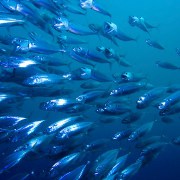 Photo: Getty Images
Photo: Getty Images
McDonald's, the world’s biggest fast-food company announced in June, 2011 that it would begin selling sustainable fish certified by the eco-label of the Marine Stewardship Council in all of its European outlets. McDonald’s sells about 100 million fish sandwiches in Europe each year.
Sustainable seafood supports healthier oceans because it is seafood fished or farmed in a way that can maintain or increase production in the long term, without jeopardizing the health or function of life in the oceans, according to the David Suzuki Foundation.
The Marine Stewardship Council works to encourage stores, restaurants and consumers to choose fish harvested in responsible by employing third-party companies to certify that fisheries are managed to safeguard jobs, maintain fish stocks and protect the ocean.
Seafood has come under recent debate in health circles. On one hand, seafood is full of healthy omega-3 fatty acids and is a great source of protein and other vital nutrients. On the other, seafood has become big business. With high demands for seafood, oceans have become overfished, fish are contaminated with toxins like heavy metals and mercury, and new practices like fish farming, or aquaculture, are working to keep up with world seafood demand. But not all fishing and farming operations are good for the ocean environment.
“This step, taken by a company with a volume of distribution as large as it has, shows the growing demand from the general public for more ecological sustainability in European fisheries and for the recovery of overexploited fish stocks,” said Xavier Pastor of the Oceana marine conservation group in a New York Times article.
McDonald’s move to sell sustainable fish is seen as a big win for environmental advocates, but has many wondering if it can happen in Europe, can it happen in the U.S.?
The U.S. ranks third for world seafood consumption, behind China and Japan. The average American ate almost 16 pounds of fish and shellfish in 2009, according to the National Oceanic and Atmospheric Administration (NOAA) Fisheries Service.
“With one of the highest consumption rates in the world, the U.S. has the ability to affect the world fish trade,” said Eric Schwaab, an assistant administrator for NOAA’s Fisheries Service in a statement. “NOAA supports rebuilding and sustaining wild fisheries populations and building a strong aquaculture program that can help the U.S. fishing industry gain a larger share of the U.S. market. Americans should know that buying American seafood supports our economy, as well as the high environmental and safety standards our fishermen meet.”
About 84 percent of the seafood consumed in the U.S. is imported and farmed seafood makes up about half of those imports. Aquaculture production supplies about half of the world’s seafood demand, according to the United Nation’s Food and Agriculture Organization.
In the U.S. retailers are making an effort to get on the sustainable seafood bandwagon. Wal-Mart announced that all fresh and frozen seafood in its stores will be certified by the Marine Stewardship Council or the Global Aquaculture Alliance by June, 2012. Greenpeace ranked Target and Safeway as two of the top retailers for sustainable seafood in 2011.
As for McDonald’s, spokespeople say there have been conversations about putting sustainable seafood on the menu in the U.S.
For more information about sustainable seafood in your area, check out The Monterey Bay Aquarium Seafood Watch program that helps consumers and businesses make choices for healthy oceans.
Suzanne Boothby is a Brooklyn-based wellness writer, certified health coach and co-founder of New York Family Wellness. Visit www.suzanneboothby.com to learn more.
McDonald’s to Serve Sustainable Fish in Europe
Monterey Bay Aquarium Seafood Watch
Reviewed June 30, 2011
by Michele Blacksberg R.N.
Edited by Alison Stanton





Add a CommentComments
There are no comments yet. Be the first one and get the conversation started!